Jerry
Reed

-
Inducted2017
-
Born
March 20, 1937
-
Died
September 1, 2008
-
Birthplace
Atlanta, Georgia
Early Work and Success as a Songwriter
Jerry Reed left indelible marks as a hit recording artist, virtuoso guitarist, songwriter, and movie star. His guitar work was marked by syncopation and complexity, while his songwriting and stage persona conveyed strutting wit and backwoods intelligence. Still widely emulated as a picker, he combined complex independent lines in the guitar’s bass and treble ranges and used rippling combinations of fretted and open strings. During his lifetime, Reed influenced singer-guitarists such as Steve Wariner and prominent studio guitar players, including Brent Mason and even Chet Atkins, who recorded several Reed songs on his own albums and as well as two duet guitar albums with Reed.
“Every move he made was to entertain and make the world more fun,” Reed devotee Brad Paisley said after Reed’s death in 2008. “Because he was such a great, colorful personality with his acting and songs and entertaining, sometimes people didn’t even notice that he was just about the best guitarist you’ll ever hear.”
Reed’s electric mix of picking and grinning caught fire only after years spent paying his dues. Born Jerry Reed Hubbard in Georgia, he began learning to play guitar as a boy and had appeared on shows with Faron Young and Ernest Tubb by his early teens. By the time he was seventeen, Reed had captured the attention of Capitol Records producer Ken Nelson.
In 1955, Reed recorded his first sides for Capitol, but they failed to gain much traction. However, Atlanta music publisher Bill Lowery encouraged Reed to write songs, and in 1957, rockabilly singer and labelmate Gene Vincent released a version of Reed’s “Crazy Legs” as a single.
Reed ended his association with Capitol in 1958 and enlisted in the U.S. Army the following year. While he was in the service, Brenda Lee earned a Top Ten pop hit with Reed’s composition “That’s All You Gotta Do.”
Songs
00:00 / 00:00
00:00 / 00:00
00:00 / 00:00
Moving to Nashville and Working with Chet Atkins
After his military discharge, Reed moved to Nashville in 1962 with his wife, Priscilla, who had her own #1 country record as Roy Drusky’s duet partner on 1965’s “Yes, Mr. Peters.” That same year, after switching to Columbia Records, Reed scored two minor pop hits: “Goodnight Irene” and “Hully Gully Guitar.” He also took jobs as a session guitarist, appearing on chart-makers by Bobby Bare and others, and wrote songs for country heavyweights including Porter Wagoner (“Misery Loves Company,” a 1962 chart-topper).
After signing Reed to RCA Records, Atkins told Reed simply to be himself in the studio, to let fly with his funky, down-home wit and hard-earned guitar mastery. Reed developed an instantly recognizable and idiosyncratic method of playing the guitar—called “claw style” for the shape his right hand made—that suited humor-filled compositions such as “Guitar Man,” covered by Elvis Presley along with the Reed song “U.S. Male” (Reed played lead guitar on both Presley recordings), and his own crossover hit, the highly rhythmic “Amos Moses.” Artists ranging from Johnny Cash to Engelbert Humperdinck also cut Reed’s songs.
Reed shared a Grammy with Atkins for the instrumental album Me and Jerry in 1971. One year later, he won Best Country Vocal Performance, Male for “When You’re Hot, You’re Hot.” A third Grammy, this one for Best Country Instrumental Performance, came in 1993, for Sneakin’ Around, another guitar duet effort with Atkins.
Other major Reed hits include “Lord, Mr. Ford” (1973), “East Bound and Down” (1977), and “She Got the Goldmine (I Got the Shaft)” (1982). His instrumental composition “The Claw” remains a standard many players seek to master.
Videos
“When You’re Hot, You’re Hot”
Country Music Association Awards, 1971
“She Got the Goldmine (I Got the Shaft)”
Nashville Now, 1991
“Because he was such a great, colorful personality with his acting and songs and entertaining, sometimes people didn’t even notice that he was just about the best guitarist you’ll ever hear.” —Brad Paisley
Photos
-
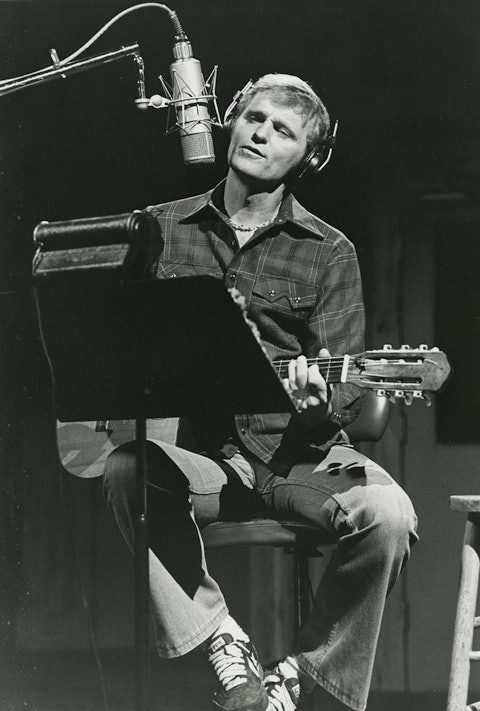
Jerry Reed at a recording session, 1970s.
-
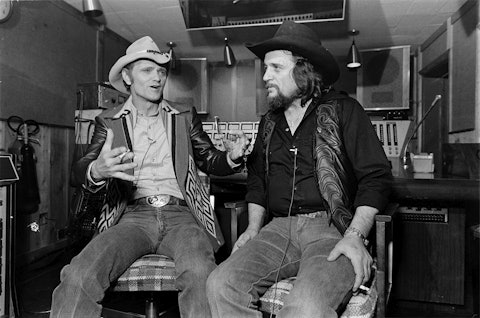
Jerry Reed and Waylon Jennings at RCA Studio B, 1983. Photo by Paula Anderson.
-
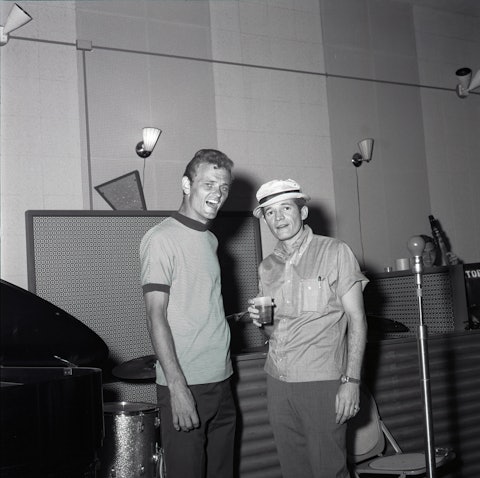
Jerry Reed and Don Bowman at RCA Studio B, 1960s.
-
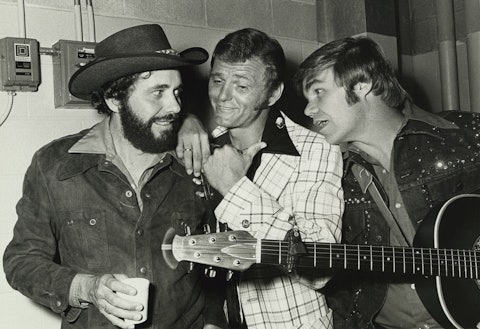
From left: Bobby Bare, Jerry Reed, and Dickey Lee backstage during Fan Fair, 1975. Photo by Bill Goodman.
-
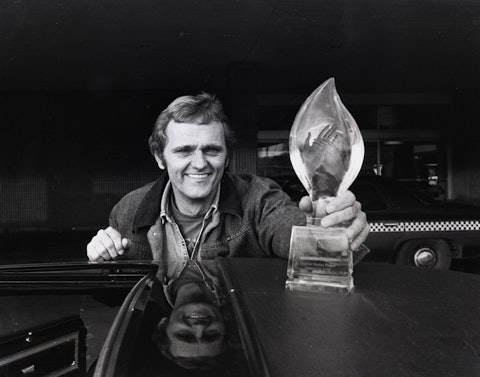
Jerry Reed shows off his People’s Choice Award for Favorite Supporting Actor in a Motion Picture, c. 1979. Photo by Walden S. Fabry Studios.
-
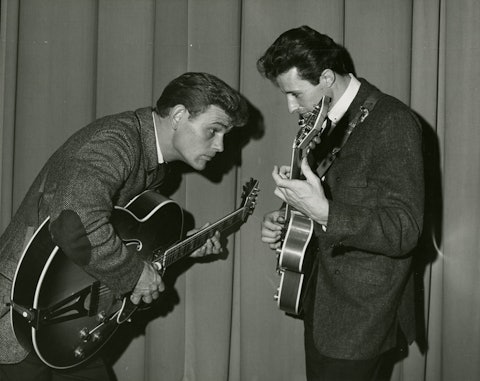
Jerry Reed with Chip Young, 1964.
-
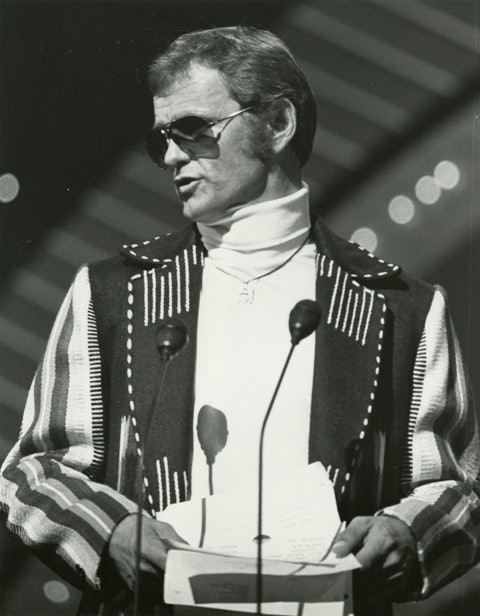
Jerry Reed at the Country Music Association Awards, 1979. Photo by Steven Goldstein.
-
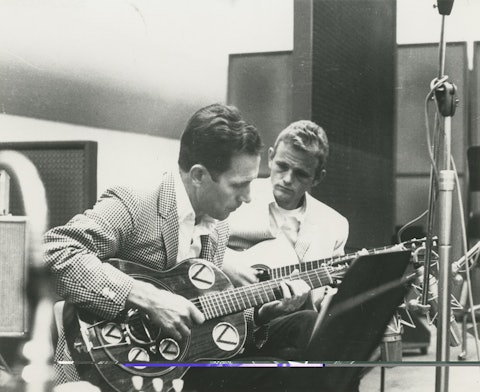
Jerry Reed with Chet Atkins at RCA Studio B, 1950s.
-
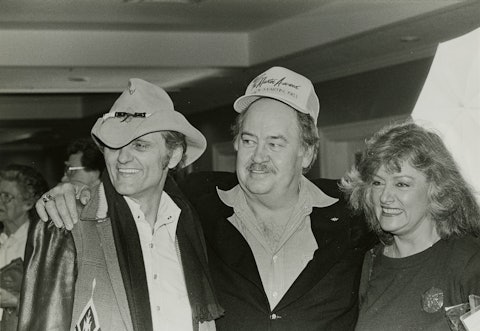
From left: Jerry Reed, Grady Martin, and Frances Preston, 1980s.
-
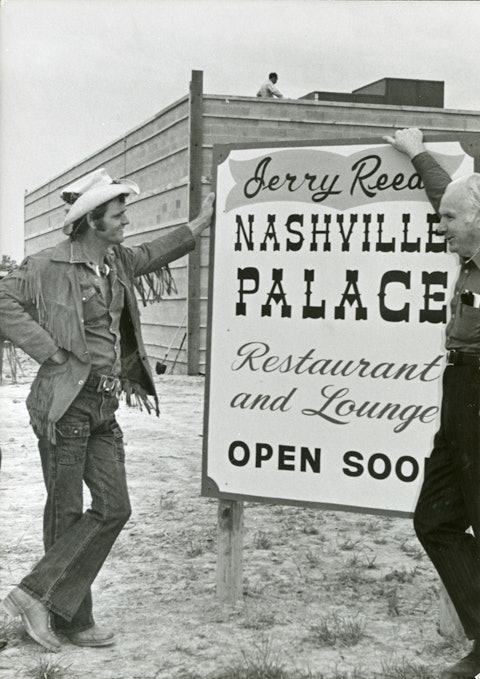
Jerry Reed with Louis McRedmond at the future Nashville Palace, 1977.
A Career in Film
Reed’s regular appearances on CBS’s Glen Campbell Goodtime Hour led to his wisecracking country boy role in the 1975 Burt Reynolds vehicle W. W. and the Dixie Dancekings. Mostly playing to his own wilder side, Reed appeared in Reynolds’s Gator (1976), Smokey and the Bandit (1977), High-Ballin’ (1978), Hot Stuff (1979), Concrete Cowboys (a 1979 TV movie that resulted in a brief 1981 CBS series starring Reed), Smokey and the Bandit II (1980), Smokey and the Bandit III (1983), and Survivors (1983).
As Reed’s film career prospered, however, his records lost steam. After “Lord, Mr. Ford,” he posted only two Top Ten hits—the Smokey and the Bandit theme “East Bound and Down” (1977) and “(I Love You) What Can I Say” (1978)—until his pair of 1982 novelty hits, “She Got the Goldmine (I Got the Shaft)” and “The Bird.” Reed and Waylon Jennings joined forces for a 1983 hit remake of the Sam and Dave oldie “Hold On, I’m Comin’,” but by 1984, Reed was off RCA.
In 1985, Reed produced, directed, and starred in the music-business action flick What Comes Around, with dismal box-office results. In 1988, he co-produced, starred in, and wrote songs for the Vietnam action movie BAT 21, with Gene Hackman. Nashville 99, Reed’s 1976-1977 police action TV series, was short-lived.
Reed kept a relatively low profile after 1990, although he appeared in Adam Sandler’s 1998 comic film The Waterboy. In 1998, Reed joined forces with Bobby Bare, Waylon Jennings, and Mel Tillis to form the group Old Dogs, and the quartet released a self-titled album of songs written by Shel Silverstein. In addition to working in Old Dogs, he continued to tour on his own and made occasional television appearances into the 2000s. Reed was elected to the Nashville Songwriters Hall of Fame in 2005. He died of complications resulting from emphysema in 2008.
—Thomas Goldsmith
Adapted from the Country Music Hall of Fame® and Museum’s Encyclopedia of Country Music, published by Oxford University Press



